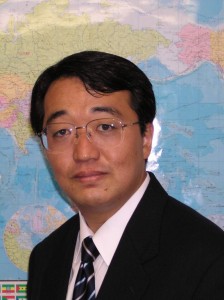緊張と統合:内村鑑三におけるキリスト教と日本の精神
このシリーズでは、私が1994年に執筆した統一神学大学院(Unification Theological Seminary)の神学課程修士論文(Divinity Thesis)を日英二か国語で掲載している。
4.日本文化とキリスト教の統合の続き
武士道という言葉は、武士階層における階級倫理を表し、古代の軍事主義、禅、新儒学など、非常に長い期間にまたがる広範囲な思想を包含している。しかしベラは武士道の本質を「忠の宗教」と定義しており、そこにおいては個人の封建領主に対する義務は一種の宗教的究極性を示しており、他の宗教的配慮をはるかに越えているとする。最も強烈な型の武士道は、18世紀初頭に編まれた武士道の概要書である「葉隠」によく示されている。それは「武士道とは、死すべき決然たる覚悟を意味する」と言っている。自己の主君に奉仕して死ぬ事は、武士には最もふさわしい最期と考えられ、そのような死は、ほとんど宗教的な意味での「救い」の性質をもっていたのである。
このような死に対する態度は、禅における生死を超越した神秘的な状態と密接に関連している。死ぬ覚悟ができているから死に何の苦痛も感じない。自我は排除される。このような態度は、武士が禅宗に大きな関心を示した事と結びついている。禅宗においては、真の自己を曇らせ、我々がそれと一体化した状態に至るのを妨げているのは我執である。したがって道徳的な自己啓発とは、利己的な欲望と絶え間なく戦う努力なのである。
武士の倫理のもう一つの特徴は、「学問」に対して非常に敬意を払う事である。ほとんどすべての武士は読み書きができ、そして少なくともいくつかの儒教の古典に通じていた。しかし学問はそれ自体を目的とするものではない。学問の目的は、自己を修養し、他者を統制する事にある。学問と実践とは同一のものであり、学問を学ぶ事とその結果は、二つのものではなく一つのものである。
このほとんど禁欲的ともいえるライフ・スタイルの最も重要な特徴は、忠と孝、服従と正直、節約と勤勉であった。それらはすべて、目上の者に対する私心の無い献身、最小限の個人的消費、日々の仕事と義務の厳格な実行を要求した。武士道のライフ・スタイルは「倫理的行動主義者」、「世俗内禁欲者」である点においてピューリタニズムと一致しており、この様な倫理は、明らかに経済的合理化ならびに政治的合理化への傾向を促進したのである。
無教会のライフ・スタイルは、これら全ての武士道の倫理によって特徴付けられる。禁酒と禁欲生活は彼らのモットーであった。個人の行動は控えめで威厳を伴っており、謙遜と自制に対する強い内的意識に動機付けられていた。もし我々がこの様な二つの倫理の根底を流れる共通性を認識するならば、内村が使徒パウロを理想的な侍であったと述べたとしても、それは驚くには当たらない。
ユダヤ人にしてイエス・キリストの弟子なりしパウロは、真正(ほんとう)の武士にして、武士道の精神を体現したる者であった。彼は言うた、「わが誇るところを人にむなしくせられんよりは、むしろ死ぬるはわれに善き事なり」(コリント前書9・15)と。彼は乞求(きっきゅう)、依頼の恥辱を忍ばんよりは、むしろ死なんことを欲した。彼はまた言うた、「金銭を慕うは、もろもろの悪事の根なり」(テモテ前書6・10)と。彼の見るところによれば、今日いわゆる商業政策すなわち商売根性は諸悪の原因であって、個人を毒し、社会を腐らし、国家を滅ぼすものであると。さらにまたパウロほど、その主(きみ)に対して忠なる人はなかった。・・・かくて彼はいにしえの武士の模範であった。彼のごときは、・・・近代キリスト教信者の内に見ることができない。(教文館、信仰著作全集第23巻、p.28)
IV. Synthesis of Japanese Culture and Christianity(Cont.)
The term Bushido used to describe the status ethics of the samurai class covers a wide range of ideas over a considerable span of time: e.g., primitive militarism, Zen Buddhism, and Neo-Confucianism. However, Bellah defines the essence of bushido as “the religion of loyalty,” in which to show the obligation to one’s feudal lord taking a sort of religious ultimacy and overriding other religious considerations. The most intense form of Bushido is well illustrated in Hagakure, an epitome of Bushido compiled in the early 18th century. It is said, “Bushido means the determined will to die.” Death in the service of one’s lord was considered the most appropriated end for a samurai, which had almost a “saving” quality in the religious sense.
This attitude toward death is closely related to a mystical state in which one is beyond life and death in Zen Buddhism; being determined to die, death has no sting. The self is eliminated. These attitudes are linked to the great interest the samurai showed in Zen Buddhism. In Zen Buddhism, it is selfishness which obscures the true self and keeps us from attaining the state of oneness. Consequently moral self-cultivation is a constant efforts to combat selfish desire.
Another feature of the samurai ethic is the very high regard for learning (gakumon). Almost all the samurai were literate and had acquaintance with at least some of the Confucian classics. But learning is not for its own sake. It has as its aim the cultivation of the self and the control of others. Learning and action are the same. The practice of learning and its result are not two but one.
The most important features of this near ascetic life style are loyalty and filial piety, obedience and righteousness, economy and diligence. All demanded selfless devotion to superiors, a minimum of personal consummation, and a vigorous prosecution of daily tasks and duties. There were at one with Bushido in being “ethically activist” and “inner worldly ascetic.” Such an ethic clearly reinforced the tendency to political rationalization as well as economic rationalization.
The Mukyokai life style is characterized by all of these Bushido ethics. Sobriety and austerity are their motto. Personal behavior is reserved and dignified, motivated by a strong inner sense of modesty and self-control.(19) If we understand this underlying continuity of ethics, it is not surprising that Uchimura describes the apostle Paul as ideal samurai:
Paul, a Jew and a disciple of Jesus the Christ was a true samurai, the very embodiment of the spirit of Bushido. Said he, “for it were better for me to die, than that any man should make my glorying void.” He preferred death to dishonor, to dependency, to begging whatever cause. Again he said: “For the love of money is the root of all evil.” Commercialism, in his view, was the cause of all evil, individual, social, and national. Then, none was more loyal to his master than Paul was to his, Jesus. Paul was a type of the old samurai, not to be found among modern Christians.(20)
(14)Robert Bellah, Tokugawa Religion, the Values of Pre-Industrial Japan, (New York: The Free Press, 1957), p.90-3.
(15)Ibid., p.92.
(16)Ibid., p.77.
(17)Ibid., p.96.
(18)Ibid., p.98.
(19)op cit, Caldarola, p.104.
(20)Uchimura, Shinko Chosaku Zenshu [Collected Works on Faith], (Tokyo: Kyo Bun Kwan, 1966), XXIII, p.28.
